Cane Corso Information & FAQS
16 Points To Know About The Cane Corso dog
16 Points To Know About The Cane Corso dog (question and answer guide)
A powerful and commanding breed with a lengthy history that dates back to the Roman era is the Cane Corso. Potential owners should be aware of the Cane Corso’s distinctive physical and behavioral characteristics as a huge, muscular Italian Mastiff. The Cane Corso needs specific training and care due to its vulnerability to certain medical issues and appropriateness as security or service dogs. Their size, need for exercise, and innate shyness make them more appropriate for houses with yards than apartments. However, the Cane Corso may make a wonderful family pet, offering devoted protection and affection, to the right owner. To decide if a Cane Corso is the correct breed for them, potential owners should learn about the breed’s history, looks, longevity, grooming needs, and temperament. This introduction covers sixteen important topics of this remarkable and adaptable Cane Corso breed.
1). Describe a Cane Corso.
Large and robust, the Cane Corso is an Italian working dog breed that was developed for farm labor, hunting, and security. They are renowned for their remarkable strength, size, and loyalty.
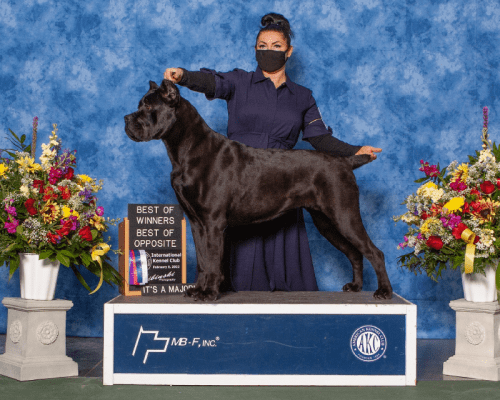
A thorough explanation of the Cane Corso dog breed can be found here:
Large and muscular, the Cane Corso breed of dog originated in southern Italy’s Molossian areas. They are descended directly from the Molossian guard dogs and battle dogs that the Roman Empire formerly employed.
The Cane Corso is a large, strong dog in terms of appearance. Their large, square head is paired with robust jaws and a strong, somewhat convex nose. They have cropped their ears into an upright, pointed form. The short, glossy coat of the Cane Corso is available in a range of hues, such as black, gray, fawn, red, and brindle. Additionally typical are white markings on the paws and chest.
These dogs are built robustly and huge. Cane Corso weight ranges from 99 to 110 pounds for males and 88 to 99 pounds for ladies. Their limbs are well-defined and strong, and their chest is deep and broad. The tail of the Cane Corso is typically docked, but if it is left natural, it tapers to a point and is thick at the base.
The Cane Corso is recognized for having a devoted, self-assured, and protective nature. They need strict, constant training and socializing from an early age because they can have strong wills. The Cane Corso may be a wonderful, loyal friend for the correct owner. But because of their physical strength and protective nature, they are not suited for timid or inexperienced owners.
The Cane Corso has been employed historically in farm labor, hunting, herding, and guarding duties. They were an indispensable working dog in peasant villages and on rural Italian farms. Cane Corsos have also been used for personal protection, law enforcement, and the military in more modern times.
All things considered, the Cane Corso is a historic, distinctively Italian breed that combines enormous physical strength with a fearless, perceptive nature. Although they are not a dog for the timid, they can become a brave and devoted friend with the correct training and upkeep.
2). From where do Cane Corsos originate?
Originating in southern Italy, Cane Corsos are descended from the ancient Roman Molossus military dogs. Before selective breeding brought the species back to life in the 20th century, it was on the verge of extinction.
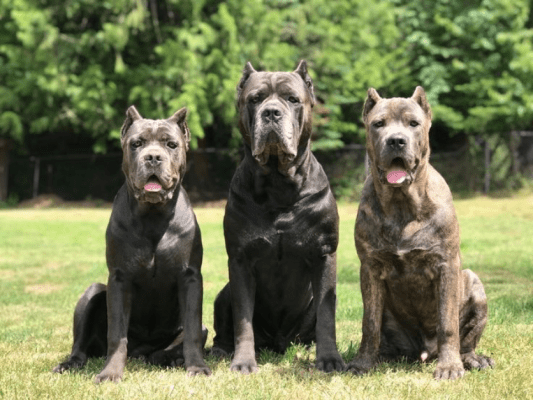
My understanding is that the Cane Corso breed is native to the southern Italian Molossian regions. In particular:
The Cane Corso is directly descended from the Molossian battle dogs and guard dogs of antiquity that were employed by the Roman Empire. The contemporary Cane Corso breed derives its origins from the Molossian dog breed, which originated in the Molossian regions of southern Italy.
Devoted breeders searched far and wide in the 1970s for and protected the few Cane Corso bloodlines that remained from these old Molossian dogs. As a result, the Cane Corso breed was resurrected and established as the unique breed that it is today.
In conclusion, the Cane Corso’s ancestors were Molossian guard and war dogs that were first developed and utilized in the Molossian regions of southern Italy, which is where the Cane Corso got its start. Later, in the second part of the 20th century, Italian breeders rebuilt and standardized the Cane Corso breed to become what it is today.
3). How large can a Cane Corso grow?
Male Cane Corsos usually weigh between 99 and 120 pounds and have a shoulder height of 24 to 27 inches. The females weigh between 88 to 105 pounds and are slightly smaller, measuring 23 to 26 inches.
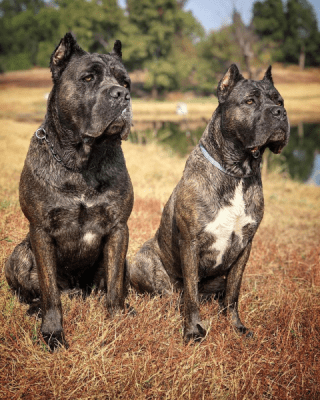
Based on the available data, Cane Corsos are a huge and impressive breed of dog that can grow to quite large sizes:
Male Cane Corsos usually weigh between 99 and 110 pounds and have a shoulder height of 25 to 28 inches.
Females weigh between 88 and 99 pounds and are 23 to 26 inches tall, making them slightly smaller but still fairly huge.
The Cane Corso has a large, robust frame with distinct muscles and a deep chest. This contributes to their overall robust and powerful appearance, which is typical of the breed.
Male Cane Corsos can grow to a maximum height of 28 inches at the shoulder, but females can only reach a maximum height of 26 inches. The weight range is similarly astonishing, with females topping out at approximately 99 pounds and men possibly reaching over 100 pounds.
In conclusion, males of the Cane Corso breed tend to be much larger than females, making them a notably large and heavy-set breed. This ancient Italian working dog is distinguished by its strong physique and commanding size. The breed’s reputation as a powerful and intimidating companion is largely due to its massive size and power.
4). How do Cane Corsos appear?
Cane Corsos are strong, muscular dogs with upright ears, a large skull, and a short nose. They have a short, smooth coat, and frequent coat colors are brindle, fawn, gray, and black.
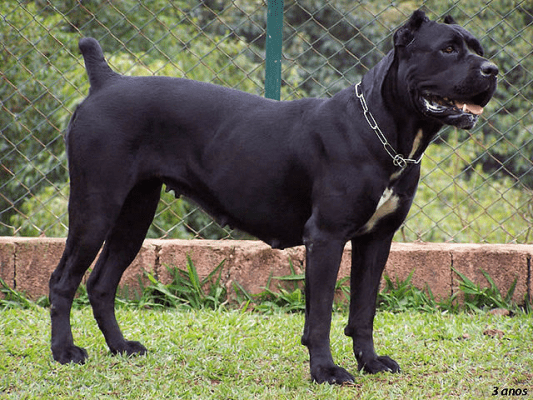
Cane Corsos have a physically striking and strong appearance. Here’s a more thorough explanation of their usual appearance:
Structure and Stature:
- Large, powerful, and robust breed a large, deep chest and well-defined muscles robust, thick paws and legs Overall, strength and athleticism are evident.
Head:
- Big, wide, and shaped a little like a rectangle
pronounced muzzle and brow ridges
Dark, expressive eyes that project a vigilant, assured stare
strong, somewhat undershot jaw
Coloring and Coat:
- a brief, thick, and glossy coat
Coat colors that are common include brindle, fawn, gray, and black.
perhaps white markings on the muzzle, paws, or chest.
Ears and Tail:
- Traditionally, the tail is cropped and appears docked.
Ears are cut to face forward and stand erect.
All things considered, the Cane Corso presents a powerful, athletic, and commanding image. They exude strength and power due to their huge, broad heads, substantial bodies, and attentive looks. The physical attributes of the breed are a reflection of its origins in Italy as a versatile guard and working dog breed. Cane Corsos have a stunning visual appearance that exudes confidence, intellect, and capability.
5). Are Cane Corsos hostile dogs?
Although they are a strong, protective breed that needs the right training and socialization to create a stable, non-violent disposition, cane corsos are not naturally aggressive. It’s crucial to own responsibly.
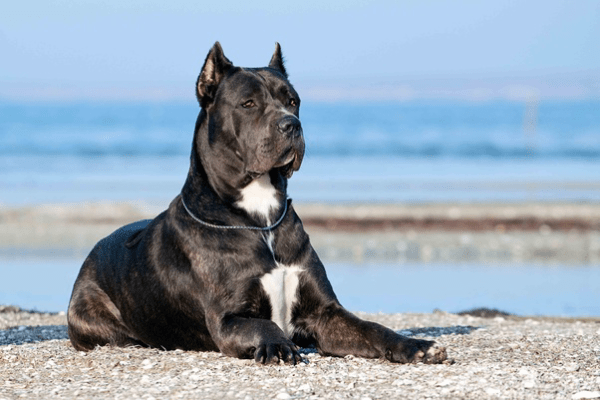
No, it’s not widely accepted that Cane Corsos are violent or antagonistic by nature. Despite their reputation for being strong and frightening, Cane Corsos may be devoted, loving, and gentle companions if given the right training and socialization.
The following are some salient features of Cane Corso temperament:
Because they were first developed in Italy as working and guard dogs, cane corsos have a strong sense of territorial and protective instincts. That does not imply that they are inherently antagonistic, though.
- Cane Corsos who receive early and thorough socialization are usually peaceful, docile, and amiable with family members, including kids. They and their owners can develop incredibly close ties.
- Cane Corsos are generally not aggressive unless they sense a real threat, though they may be suspicious of strangers. A good education aids in developing self-assurance and judgment.
- Cane Corsos need responsible ownership and constant obedience training from an early age, just like any other huge, powerful breed. This facilitates the constructive channeling of their strength and protective impulses.
- Despite their intimidating appearance, Cane Corsos are considered to be intelligent, devoted, and generally laid-back dogs when given the correct environment, exercise, and training.
- In conclusion, canines such as the Cane Corso have the ability to be frightening and protective, but they are not naturally aggressive. If given the appropriate upbringing and socialization, they can become loyal and kind friends. Their disposition is mostly influenced by their training and responsible ownership.
6). How much exercise is necessary for Cane Corsos?
Because they are energetic dogs, cane corsos need frequent, intense exercise, such as playing in a safe, enclosed yard, taking long walks, or jogging. It is advised to be active for at least one or two hours per day.
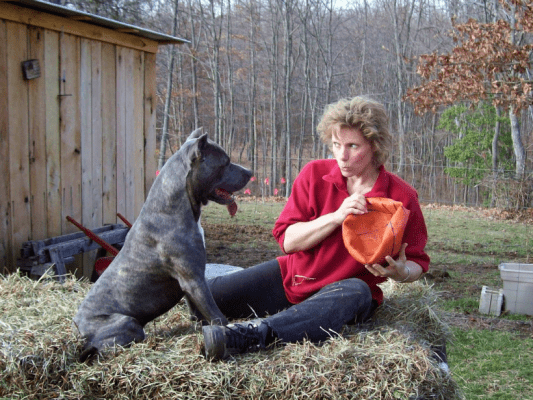
Cane Corsos demand a lot of exercise, and they need to be physically active on a daily basis to stay healthy.
Cane Corsos often require the following as a general rule:
• a minimum of 60 to 90 minutes a day, divided among several workouts
• a mix of lengthier, more leisurely workouts, like hiking, and more intense ones, like running
• Possibilities for cognitively engaging play, such retrieve, agility training, or obedience exercises
Important information on Cane Corso exercise requirements:
→ Because of their size, strong physique, and working dog ancestry, Cane Corsos have high energy levels and need lots of physical activity every day.
→ Insufficient exercise might cause them to get bored and frustrated, which can result in behavioral problems like destructiveness, excessive barking, or aggression.
→ Exercise should be gradually increased, particularly for younger Cane Corsos, in order to avoid overexertion or joint-related injuries.
Cane Corsos benefit from regular playfulness, exploration, and cerebral stimulation in addition to daily planned exercise.
Maintaining Cane Corsos’ physical health, mental stability, and general well-being requires giving them the necessary amount of exercise each day. Potential owners must be willing to invest the time and energy necessary to satisfy the breed’s high needs for exercise.
7). Are Cane Corsos excellent family pets?
A well-socialized and trained Cane Corso can form a devoted and loving family member. They are, however, best suited for seasoned owners who have the patience and time to offer tough, persistent supervision because of their size and strength.
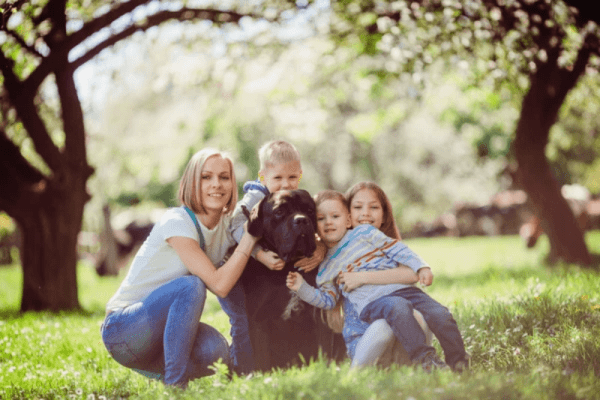
Although they do take responsible management, appropriate training, and socialization to bring out their kind and gentle nature, Cane Corsos may make wonderful family pets.
Here are some important details regarding family pet cane corsos:
Possibility of Loyalty and Adoption:
• When well-socialized and reared from an early age, Cane Corsos can exhibit remarkable levels of loyalty, patience, and affection towards family members, particularly young ones.
• They can develop close relationships with their human families and be fiercely protective of the people they love.
Socialization and training are necessary:
• It takes a lot of socialization and training to guarantee that Cane Corsos have a composed, well-mannered demeanor among people, particularly kids.
• It is essential for Cane Corsos to have proper training and be exposed to a variety of situations and experiences from an early age in order to instill good behavior and suppress any aggressive tendencies.
Keeping an eye on kids:
• Even though they can be kind and understanding toward kids, Cane Corsos should always be watched when they are around small family members.
• If not properly trained, their size and strength could cause them to inadvertently topple over or hurt a youngster.
Dedication and Accountability:
• Cane Corso owners must devote a lot of time to meeting their dog’s high exercise and training requirements.
• Those who are considering owning a Cane Corso must be ready to commit the time, money, and resources required to raise a well-mannered family member.
Cane Corsos may become incredibly beautiful, devoted, and loving family dogs with the correct owner dedication, training, and socialization. As opposed to certain other dog breeds, they do need more specific care and attention.
8). Are Cane Corsos heavy shedders?
Although Cane Corsos have short coats with little shedding, they do shed throughout the year, with heavier sheds during certain seasons. Shedding can be controlled with routine brushing.
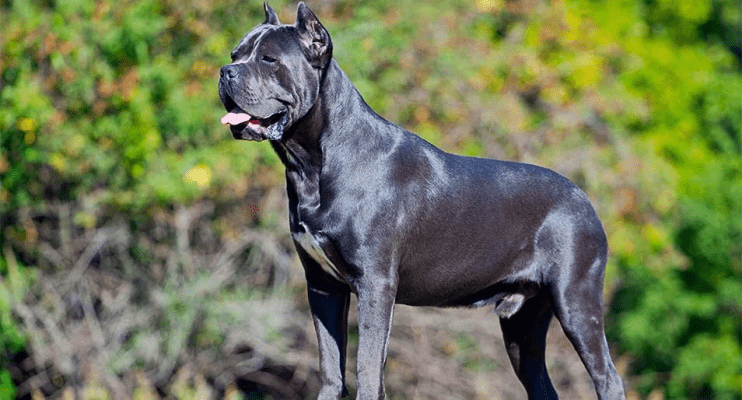
No, Cane Corsos do not fit the definition of heavy shedders. With consistent grooming, their mild shedding tendency can be controlled.
Some important details regarding Cane Corso shedding
•The short, dense double coat of Cane Corsos sheds seasonally, with spring and fall seeing the most amount of shedding.
•Throughout the year, they often shed a substantial amount of fur, but not as much as certain other dog breeds who are notorious for heavy shedding.
•The quantity of loose fur in and around the house can be controlled and reduced with regular brushing and combing, which should occur 1-2 times per week.
•In order to keep up with the moderate amount of fur, owners of Cane Corsos should anticipate vacuuming and lint rolling more frequently during the peak shedding seasons.
By eliminating loose undercoat, professional grooming every six to eight weeks can also help control and minimize shedding.
Although they do shed, most Cane Corso owners find that their shedding is controllable with a consistent grooming regimen. Compared to certain long-haired or double-coated breeds, they do not require the same degree of rigorous shedding control.
Cane Corsos have moderate shedding that can be controlled with good grooming and coat care, making them a reasonably low-maintenance breed in terms of hair and fur management requirements.
9). What’s the lifespan of a Cane Corso?
With the right care, a cane corso’s lifespan can reach nine or twelve years. They can live longer depending on things like nutrition, activity, and health care.
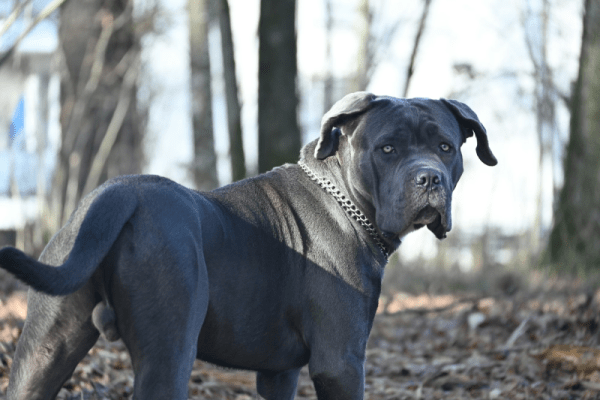
A Cane Corso’s life expectancy is nine to twelve years.
Cane Corsos are regarded as huge dog breeds, and much like many large breeds, their lifespans are typically shorter than those of lesser dog types. A healthy Cane Corso can expect to live for nine to twelve years on average.
The following are some important variables that affect the Cane Corso’s lifespan:
• Genetics and Breeding: Cane Corsos’ average lifetime can be raised by ethical breeders who place a high value on longevity and health-related attributes.
• Diet and Nutrition: The general health and longevity of a Cane Corso can be enhanced by feeding them a high-quality, nutritionally balanced diet that is specific to their needs.
• Exercise and Activity Levels: Cane Corsos can live longer and be in better shape if they follow a healthy exercise regimen and don’t get obese.
• Veterinary Care: A Cane Corso’s lifespan can be extended with routine examinations, preventative care, and timely resolution of any health issues.
• Environment and Lifestyle: A Cane Corso’s life expectancy can also be affected by variables such as stress levels, availability of veterinary treatment, and exposure to poisons or dangers.
Although the Cane Corso breed has an average lifespan of nine to twelve years, individual health, genetics, and lifetime care can all affect how long a dog lives. Cane Corsos can live longer if their owners take responsibility for their care and put their welfare first.
10). Cane Corsos make excellent security dogs?
Yes, when trained properly, the Cane Corso’s fearless personality, imposing size, and strong protective instincts make them great guard dogs. They must be carefully socialized, nevertheless, to prevent excessively hostile behavior.
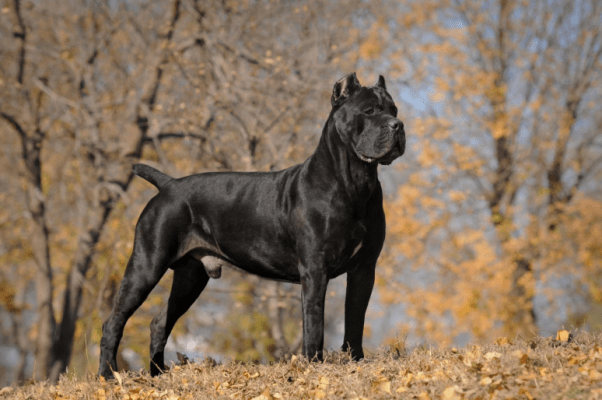
Indeed, a lot of people agree that cane corsos make great guard and security dogs. The following explains why this breed is ideal for guarding roles:
The Innate and Temperament:
• Originally, Cane Corsos were bred to be multipurpose working dogs that could be used as protectors and guard dogs.
• They are attentive and watchful because to their strong protective sense and innate apprehension of outsiders.
• Cane Corsos’ self-assurance, bravery, and territorial nature make them excellent security dogs.
• Cane Corsos are able to distinguish between potential hazards and friendly dogs with the right training and socialization.
Physical characteristics:
• At 90 to 150 pounds, Cane Corsos are a robust, muscular breed. Their intimidating bulk and presence may act as a disincentive.
• They can physically control and discourage intruders thanks to their strong bite force.
• Cane Corsos look fearsome due to their large heads and jaws, and they have a short, dense coat that offers some protection.
Ability to learn and compliance:
• Cane Corsos are extremely trainable and react favorably to protection and obedience training.
• Commands like patrolling, guarding, and capturing any dangers can be taught to them.
• Cane Corsos can learn to obey directions and distinguish between potential threats and non-threats with regular training.
All things considered, the Cane Corso is a great breed for security and guard dog duties due to its mix of protective instincts, physical prowess, and trainability. Their qualities enable them to be dutiful and faithful friends as well as proficient deterrents, detecters, and responders to possible threats.
11). What is the price of a Cane Corso?
A Cane Corso puppy from a reputable breeder should cost between $2,000 and $4000 on average. Adopting from a rescue group could be less expensive. Fees for food, supplies, instruction, veterinary care, and licensing are extra.
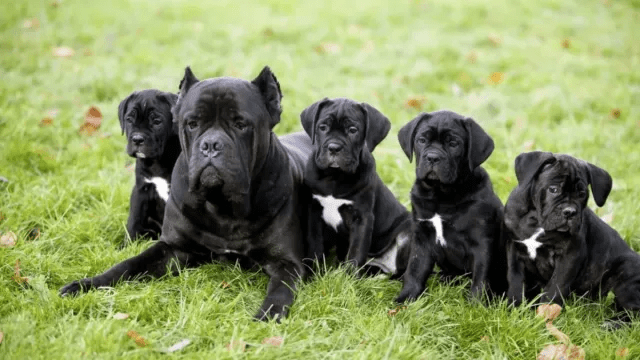
A Cane Corso’s price might vary greatly, however the following is a fair idea of what to expect to pay:
Puppies of Cane Corso:
• When purchasing a puppy from a good breeder, you should expect to pay between $2,000 and $4,000.
• Puppies’ pricing might vary depending on the dog’s lineage, show and breeding potential, and breeder’s location.
• Puppies that come from show-quality parents or high-achieving bloodlines could cost more than average.
Cane Corsos as adults:
• An adult Cane Corso may cost anywhere from $1,500 and $3,000, depending on the breed, level of training, and whether it is being given to another home.
• The lower end of this price range may apply to older, trained Cane Corsos or those that their owners are rehoming.
• Price increases may apply to dogs with considerable training, titles, or breeding rights.
Additional Fees:
Prospective Cane Corso owners should account for additional upfront and continuing expenses in addition to the purchase price, such as:
– Vaccinations, checkups, and preventive care for animals
– Provisions, provisions, and tools
– Instructional sessions and continuous mingling
Before purchasing a Cane Corso, it’s critical for purchasers to investigate reliable breeders, comprehend pedigree and health factors, and account for all related expenses. In order to guarantee a healthy, well-mannered Cane Corso that fits the owner’s wants and lifestyle, working with a reputable breeder is essential.
12). What medical conditions affect Cane Corsos?
Hip and elbow dysplasia, cardiomyopathy, hypothyroidism, and bloat are possible health issues. Breeders that are responsible check for these ailments. It’s crucial to follow a healthy diet, exercise, and veterinarian treatment.
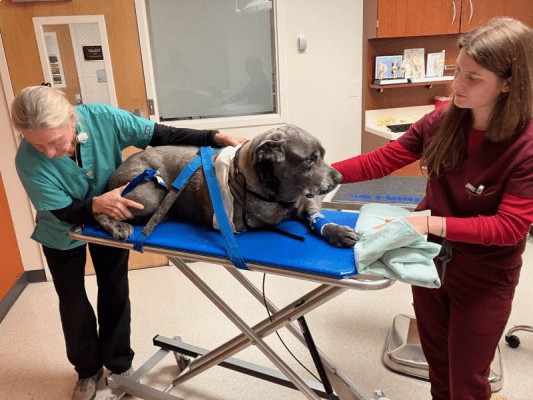
Like many large breed dogs, cane corsos are susceptible to a number of medical issues. The following are some typical health conditions that may impact the breed:
1. Hip and Elbow Dysplasia:
Cane Corsos are susceptible to developmental joint abnormalities called hip and elbow dysplasia.
Inappropriate management of this can result in excruciating arthritis and problems with movement.
Breeders that practice responsibility check for these disorders and choose dogs whose joints grow properly.
2. Allergies:
Cane Corsos are susceptible to environmental and dietary allergies, which can result in symptoms such as skin irritation and itching.
In order to control allergies in this breed, proper nutrition, grooming, and medical attention are crucial.
3. Bloat (Gastric Dilation-Volvulus):
Like other deep-chested breeds, Cane Corsos are susceptible to the potentially fatal illness known as bloat.
When the stomach twists, gas is trapped and blood flow is impeded, resulting in bloat.
Owners need to be aware of the symptoms of bloat and seek veterinarian care right once if it appears.
4. Heart Problems:
Cane Corsos may be more susceptible to heart diseases including dilated cardiomyopathy and aortic
stenosis. Early detection and treatment of these problems depend on routine veterinary examinations and screenings.
5. Neurological disorders:
Seizures and degenerative myelopathy are two neurological disorders that some Cane Corsos may be susceptible to.
In order to reduce danger in their breeding programs, conscientious breeders screen for these problems.
These typical Cane Corso health issues can be reduced with responsible ownership, which includes early socialization, healthy diet, and routine veterinary care. To increase the likelihood of obtaining a healthy, well-mannered Cane Corso, potential owners should educate themselves about the breed and consult with reliable breeders.
13). Will a Cane Corsos reside in apartment buildings?
Due to their big size and high exercise requirements, cane corsos typically do not flourish in flats. Their needs for both physical and mental stimulation are better met by a home with a large, secure yard.
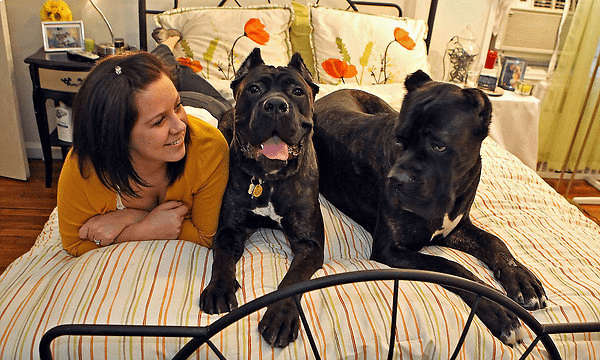
Although Cane Corsos are typically thought of as a huge, muscular breed, they may be able to adjust to apartment living if their needs for room and exercise are appropriately satisfied.
A few important things to keep in mind when bringing Cane Corsos into flats are as follows:
Exercise Requirements:
• Cane Corsos are an energetic breed that need frequent mental and physical stimulation to keep happy and healthy.
•Apartment dwellers must make sure they give enough outdoor activities for their dogs, including lengthy walks, runs, or excursions to the dog park, as living in an apartment may restrict the dog’s freedom of movement and exercise.
Space Requirements: Cane Corsos need larger living quarters than other dog breeds because they are huge dogs. Tight quarters in an apartment might not be the best for their general well-being and comfort.
But canines may be able to adjust to apartment living with the right preparation and provisions—a roomy crate, special sleeping areas, and access to outside areas, for example.
Socialization and Training: Cane Corsos are protective dogs by nature, and if they are not raised and trained correctly, they may become domineering.
They may contact with people and other animals more frequently in an apartment, so early and continuous socialization is essential to ensuring they grow up to be well-mannered and peaceful.
Noise Concerns: Compared to a home with a yard, an apartment may be more noisy due to the barking or vocalizations of a large breed, such as the Cane Corso.
Dog owners must be aware of how noisy their pets might be and take precautions to ensure that their neighbors are not inconvenienced.
Apartment buildings are a possibility for Cane Corso owners, but apartment living calls for a committed and responsible owner who will provide the dog the exercise, room, socialization, and training it needs to adjust to apartment living. Considering these things thoroughly before putting a Cane Corso into an apartment setting is advised for prospective owners.
14). Are Cane Corso’s suitable as service dogs?
When trained and socialized appropriately, Cane Corsos’ intelligence, trainability, and protective nature can make them eligible for service dog roles. However, they might not be suitable for all service dog duties because to their size and power.
Some would think that the Cane Corso’s remarkable strength, size, and protective nature make them perfect service dogs. However, they are a difficult choice for this position due to their distinct temperament and training needs.
The perfect service dog should be composed and focused, willing to collaborate closely with its handler, and have a calm, even temperament. They must have a close relationship with their owner, be extremely trainable, and be able to maintain composure in social situations.
Cane Corso Temperament and Training:
Cane Corsos have a strong guarding instinct and might be apprehensive of strangers, yet they can also be devoted and affectionate with their families. To control their protective nature and make sure they stay docile in public, extensive socialization and training are needed. For most owners, this amount of intense instruction could be too much.
Cane Corsos as Friends and Protectors:
Because of their height and power, Cane Corsos are excellent guard dogs that can ward off threats and keep their loved ones safe. In a service dog duty, however, they must maintain composure and concentrate on their handler’s demands rather than their own protective instincts. As a result, this same power and guarding drive may work against them.
Cane Corsos are certainly faithful and loving friends, but because of their distinct personalities and training needs, they might be more appropriate as family guards than as approved assistance dogs. The traits of the breed and the owners’ capacity to give the particular care and socialization needed must be carefully considered.
In conclusion, with thorough and specific training, the remarkable attributes of the Cane Corso may be utilized for service employment. However, compared to breeds specifically developed and trained for service dog jobs, they might not be the best option due to their complex temperament and the amount of care they need.
15). How is a Cane Corso trained?
Training a Cane Corso involves a strict, methodical approach along with a lot of socialization beginning when the dog is a puppy. The foundation for raising a well-mannered Cane Corso is socialization, obedience training, and positive reinforcement.
A Cane Corso needs to be properly trained in order to become a devoted, well-mannered friend. This large, powerful breed requires a tough, persistent training method. Beyond simple obedience, Cane Corso training calls for a multifaceted strategy that takes into account the breed’s distinct temperament and instincts.
Socialization from an Early Age:
To assist Cane Corso puppies feel at ease and self-assured in unfamiliar situations including people, animals, and surroundings, they need to be well socialized from an early age. This early exposure aids in taming any aggressive or wary traits that may emerge in this protective breed.
Obedience Training:
Positive reinforcement training techniques that foster a close relationship between the dog and owner work best with Cane Corsos. To guarantee that the Cane Corso stays under control, it is essential to learn fundamental obedience commands like sit, stay, come, and heel. To keep these abilities up to date, regular training sessions are necessary.
Specialized Handling:
Cane Corso owners need to learn safe handling skills because of the dog’s size and power. This include educating the dog to tolerate being groomed, walk nicely on a leash, and behave nicely during vet visits.
Guard & Protection Training:
Through targeted training, the Cane Corso’s innate guarding instincts can be harnessed to enhance its protection abilities. To keep the dog from becoming extremely hostile or possessive, this kind of training needs to be carried out carefully and under close supervision.
Patience and Consistency are Key:
Training a Cane Corso necessitates a large time investment and a patient, steady owner. These dogs react most well to a composed, confident handler who can take charge of the pack. The Cane Corso can develop into a devoted, well-mannered friend with the correct training techniques and commitment.
In conclusion, teaching a Cane Corso effectively necessitates a multifaceted strategy that covers handling, protection work, obedience, and socialization. It takes time and effort to bring out the best in this impressive, but difficult breed, therefore owners must be willing to put in that investment.
16). Are Cane Corsos allowed everywhere?
Local laws govern who can own a Cane Corso. Before obtaining a Cane Corso, it’s crucial to check local regulations as some places may have breed-specific legislation or restrictions.
The answer to the question of whether Cane Corsos are permitted everywhere is a little more nuanced than a simple affirmative or negative. Cane Corsos are a huge, powerful breed, therefore prospective owners should be informed of the limitations and rules that apply to them.
Public Access and Breed-Specific Laws: Cane Corso ownership and public access to other large, “dangerous” breeds are restricted in certain areas by laws or rules that are specific to the breed. Local laws may restrict the areas in which Cane Corsos are permitted, including public areas, residential neighborhoods, and modes of transportation.
Responsible Ownership and Socialization: Cane Corso owners are obliged to make sure their dogs are well-trained, socialized, and under control in public, even in places where breed restrictions do not apply. Restrictions or prohibitions may be imposed on violent or badly behaved Cane Corsos, no matter where they live.
Service and Assistance Dogs: If a Cane Corso is certified as a service or assistance dog, it may be permitted in some public areas, including transportation and businesses. But compared to breeds specifically developed and trained for service work, their temperament and training needs may make them less suited for these duties.
Private Land and Rentals: There may be regulations and limitations pertaining to the use of Cane Corsos and other large breeds in housing complexes, as well as private property owners and landlords. Before putting a Cane Corso into a rental or shared living arrangement, owners must investigate and abide by any applicable policies.
In conclusion, breed-specific laws, the location, the behavior and training of the dog, and the rules of specific property owners or companies can all have a significant impact on the public’s access to and acceptance of Cane Corsos. In order to guarantee that Cane Corsos are accepted in as many public areas as possible, responsible ownership and socialization are essential.
General Conclusion:
To sum up, the Cane Corso is a sophisticated breed with many facets that needs an informed and dedicated owner. Bringing a Cane Corso into your life involves several essential considerations, ranging from their aptitude as service or security dogs to their susceptibility to specific health conditions.
Due to their size, high activity requirements, and protective nature, residences with lots of room and access to the outdoors are preferable to apartments. Nonetheless, the Cane Corso can make an amazing family pet, bringing steadfast loyalty, affection, and security, to the proper owner who is prepared to give the required training, socialization, and care.
To be sure they can provide for the special demands of the Cane Corso, potential owners should conduct extensive research on the breed’s history, looks, lifespan, grooming requirements, and temperament. This magnificent Italian Mastiff can flourish and grow to be a cherished member of the family with the right care and attention. Knowing the 16 important topics discussed will help you decide if a Cane Corso is the best dog breed for your household and way of life.

